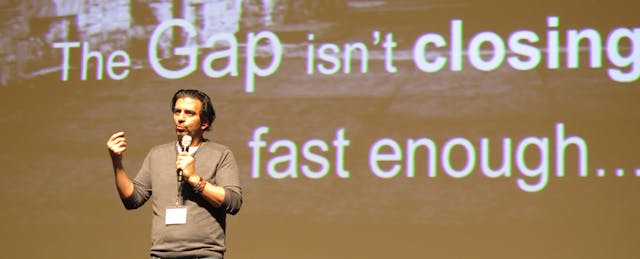Here’s what Jaime Casap, Global Education Evangelist at Google, had to say.
You are required to spend the next year of your life in either the past or the future. What year would you travel to and why?
My first thought is to go back into history and change some big event. I’d end up doing something meaningless like going back to 2008 and betting everything I had on the Giants against the Patriots in the Super Bowl.
If I could go back in time, I would go back to 1990, my senior year in college. I was reviewing graduate schools to continue studying public policy. As I was reviewing programs, my favorite political science professor suggested I apply to the Harvard Kennedy School. I laughed out loud for several minutes until I realized he was serious. I told him there was no way I’d get into Harvard, and if I did, I would get eaten alive! I reminded him kids from Hell’s Kitchen don’t go to Harvard. I never applied.
I would go back and talk me into applying. I didn’t know it at the time but I was suffering from what I now call Low Expectation Syndrome (LES). LES is so powerful and overwhelming, you don’t know you have it until you’re cured. I was a dual major, taking 18 credits a semester, and teaching 101 Intro Political Science. And yet, I suffered from LES. I didn’t believe in my capabilities or myself. I didn’t escape LES until much later in life.
After I was healed of LES, I realized many poor minority students suffer from the same condition. From a very early age we see failure all around us. We see our friends drop out of school and end up selling drugs or going to prison. We feel the weight of low expectations from the adults in our lives. School administrators project statistics and stereotypes on us. Though I had some remarkable teachers in school, I also had teachers that considered themselves “realistic” and tried to prepare us for an unpleasant future. One told me if I managed to graduate high school and stay out of jail, I was smart enough to get a city job. Police officers treated us as criminals. As just one example, when I once told a police officer we weren’t doing anything wrong as he questioned our motive for sitting on a park bench, his response was, “Maybe, but it won’t be long before you do.” Even when we escaped into the world of television, we saw minority characters that were always poor, criminals, with very low-level jobs, lazy or dimwitted.
I would go back and spend the year curing me from LES. I would give myself the same talk I give students today.
I tell students they have amazing capacity, capability and potential. I tell them to disrespect the impossible. Instead of drowning in the odds they face, use those odds as motivation.
I tell them with technology and the web they literally have all the world’s information at their fingertips. I tell them technology is not there for them to consume. It is there to enable and support their learning and curiosity.
Instead of worrying about what job they will end up in, I tell them to spend time thinking about what problem they want to solve. From that perspective, they can focus on building the knowledge, skills and abilities they need to solve that problem.
I tell them not to be ashamed of who they are or where they come from. Who they are and what they’ve experienced are competitive advantages in the long run. When they become lifelong learners and work hard at it, they will be the one in the room with their unique perspective or idea and it will be valued. I tell them their reality cannot be ignored, but they should build a strong reality distortion field and never turn it off!
Finally I tell them no one is going to cure them of LES. The antidote is inside them and only they can get rid of it! The antidote to Low Expectation Syndrome is turning it on its head and creating unreasonable and impossibly high expectations of yourself.
That is what I’d go back and do--and maybe on the way back, I’d stop by 2008 and bet big on the Giants!


